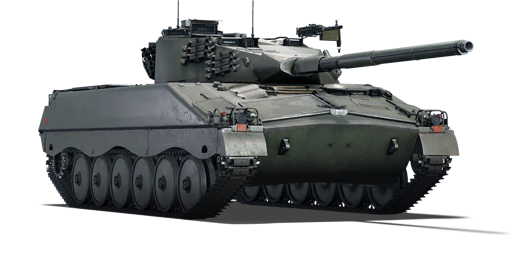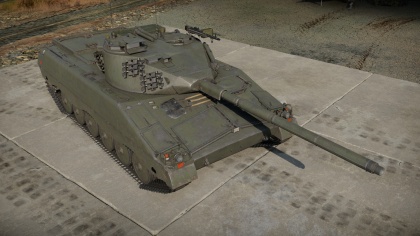Ikv 91
Contents
Description
The Infanterikanonvagn 91 is a rank Swedish light tank
with a battle rating of (AB), (RB), and (SB). It was introduced in Update 1.97 "Viking Fury".
Besides its drawbacks, it is overall an excellent light tank, notably because of its excellent HEAT-FS shell but also because of its amphibious capabilities.
General info
Survivability and armour
As one would expect from a light tank, the Ikv 91 is very weakly armoured. The armour, both on the front and sides, protects from small arms (like British 7.92 mms for example) and most splash damage. However, while the front hull also protects against .50 cals, the turret can be penetrated, which can quickly lead to death as 3 out of the 4 crew members are in the turret.
The engine and transmission are located in the rear hull, meaning that shots to the front hull are unlikely to destroy them, and shots to the rear hull are unlikely to kill as the engine and transmission will absorb most of the damage - while the crew is not close enough to be hurt by the shrapnel.
Armour type:
| Armour | Front (Slope angle) | Sides | Rear | Roof |
|---|---|---|---|---|
| Hull | 12 mm (70°) Top 20 mm (30°) Bottom |
4 mm (4°) Top 8 mm (0°) Bottom |
8 mm (3°) Top 8 mm (20°) Bottom |
8-12 mm |
| Turret | 12 mm (11-33°) Turret front 8 mm (0-70°) Gun mantlet |
12 mm (2-25°) | 12 mm (0-29°) | 12 mm |
| Cupola | 12 mm | 12 mm | 12 mm | 12 mm |
Notes:
Mobility
| Game Mode | Max Speed (km/h) | Weight (tons) | Engine power (horsepower) | Power-to-weight ratio (hp/ton) | |||
|---|---|---|---|---|---|---|---|
| Forward | Reverse | Stock | Upgraded | Stock | Upgraded | ||
| Arcade | Expression error: Unexpected * operator. | 511 | Expression error: Unexpected round operator. | __.__ | |||
| Realistic | 292 | Expression error: Unexpected round operator. | __.__ | ||||
While the Ikv 91 is slower than wheeled light tanks on road (58 km/h (36 mph) in RB/SB, 65 km/h (40 mph) in AB), it has very good mobility off-road and a good power-to-weight ratio (20.2 hp/t in RB/SB, 38.6 hp/t in AB), overall allowing it to take positions ahead of the enemy main forces and to relocate quickly.
Armaments
Main armament
The Ikv 91 has for main armament a 90 mm gun able to use two shells: HEAT-FS and HE. All shells are unlocked from the beginning, even the excellent HEAT-FS with 400 mm of penetration and a whole 655 g TNT equivalent of explosive mass. The turret traverse speed is not the best for a light tank (18.8°/s in RB/SB and 35.4°/s in AB while the American M41A1 Walker Bulldog gets 33.3°/s in RB/SB and 63.7°/s in AB) but is above average at its BR and usually enough. The same goes for targeting the gun up or down.
The reload speed is faster than average, but quite a few tanks reload faster at this BR, notably light tanks (the BMP-1 for example). The reload speed is also dependent on the first-stage ammo stowage, meaning that it will get slower should one run out of first-stage ammo.
The slow speed of both HEAT-FS and HE is offset by the laser rangefinder, a rare feature for this BR, making the Ikv 91 effective at long-range engagements too.
| 90 mm kan Ikv 91 | Turret rotation speed (°/s) | Reloading rate (seconds) | |||||||||||
|---|---|---|---|---|---|---|---|---|---|---|---|---|---|
| Mode | Capacity | Vertical | Horizontal | Stabilizer | Stock | Upgraded | Full | Expert | Aced | Stock | Full | Expert | Aced |
| Arcade | 59 | -10°/+15° | ±180° | N/A | __.__ | __.__ | __.__ | __.__ | __.__ | _.__ | _.__ | _.__ | _.__ |
| Realistic | __.__ | __.__ | __.__ | __.__ | __.__ | ||||||||
Ammunition
| Penetration statistics | |||||||
|---|---|---|---|---|---|---|---|
| Ammunition | Type of warhead |
Penetration @ 0° Angle of Attack (mm) | |||||
| 10 m | 100 m | 500 m | 1,000 m | 1,500 m | 2,000 m | ||
| slpsgr m/72 | HEATFS | 400 | 400 | 400 | 400 | 400 | 400 |
| slsgr m/72 | HE | 29 | 29 | 29 | 29 | 29 | 29 |
| Shell details | |||||||||
|---|---|---|---|---|---|---|---|---|---|
| Ammunition | Type of warhead |
Velocity (m/s) |
Projectile Mass (kg) |
Fuse delay (m) |
Fuse sensitivity (mm) |
Explosive Mass (TNT equivalent) (g) |
Ricochet | ||
| 0% | 50% | 100% | |||||||
| slpsgr m/72 | HEATFS | 820 | 4.35 | 0 | 0.1 | 655 | 65° | 72° | 77° |
| slsgr m/72 | HE | 600 | 6.7 | 0.1 | 0.5 | 2,400 | 79° | 80° | 81° |
Ammo racks
| Full ammo |
1st rack empty |
2nd rack empty |
3rd rack empty |
4th rack empty |
5th rack empty |
6th rack empty |
Visual discrepancy |
|---|---|---|---|---|---|---|---|
| 59 | __ (+__) | __ (+__) | __ (+__) | __ (+__) | __ (+__) | __ (+__) | __ |
A maximum of 59 shells for the main gun can be carried, although the high-effectiveness of the HEAT shells gives the possibility for players to only carry a fraction of that and still be able to take out several targets in one run. The first-stage ammo stowage is comprised of 16 shells all located next to the loader, the next 25 shells are located between the loader and the engine, and the last 18 shells are located in the front hull next to the driver.
Going with 16 shells is usually the best bet if one wants to lower the chances of getting its ammunition detonated as much as possible as they're all going to be at the same spot. Going with 20-25 shells is not much more dangerous as the 25 shells following the first-stage ammo are all located next to the engine, where other players do not usually shoot.
Machine guns
The Ikv 91 comes with two 8 mm machine guns: A pintle-mounted machine gun and a coaxial machine gun next to the main gun. The machine guns have a relatively slow fire-rate but are still effective at taking out exposed crew members of enemy vehicles.
| 8 mm ksp m/39B | ||||
|---|---|---|---|---|
| Mount | Capacity (Belt) | Fire rate | Vertical | Horizontal |
| Pintle | 2,000 (250) | 649 | __° | __° |
| Coaixal | 2,250 (250) | 649 | N/A | N/A |
Usage in battles
Thanks to its excellent HEAT-FS shell, the Ikv 91 can engage any target, even when up-tiered. However, a margin of caution is still needed when going against tanks that have .50 cals, as .50 cals can go through the sides and turret to then kill the gunner, loader and commander. The good mobility makes it able to go from one objective to another very quickly, and its amphibious ability gives another way to flank and makes it able to reach positions otherwise inaccessible. The laser rangefinder also gives it the possibility to quickly make accurate long-range shots. The -10° depression also allows it to take firing positions that some other tanks cannot (particularly the Russians that usually only have -5°).
Overall, the Ikv 91 can be played at mostly any range and can outmanoeuvre most of the tanks it encounters. Although it cannot attract too much attention as its particularly weak to aircraft, but is able to use smoke shells to hide in cases like these.
Modules
| Tier | Mobility | Protection | Firepower | ||
|---|---|---|---|---|---|
| I | Tracks | Parts | Horizontal Drive | ||
| II | Suspension | Brake System | FPE | Adjustment of Fire | Airstrike |
| III | Filters | Crew Replenishment | Elevation Mechanism | Improved optics | |
| IV | Transmission | Engine | Smoke grenade | Artillery Support | Laser rangefinder |
Pros and cons
Pros:
- Solid mobility, especially off-road
- Amphibious
- Excellent HEAT-FS shell that is unlocked from the beginning
- Laser rangefinder, a feature that almost no other tanks get at this BR
Cons:
- The armour does not protect against .50 cals everywhere, notably the turret
- No stabilizer
- No night-vision
- HEAT-FS loses velocity very quickly, making long distance moving targets hard to hit, even when zeroed with the range finder
History
The Infanterikanonvagn 91, or Ikv 91, was a Cold War era design made in Sweden. Although it is practically a light tank, it was designed as an infantry support vehicle, similar in role to the Russian PT-76. It was designed by Hägglunds, and ordered by the Swedish military. Hägglunds had previously designed the Pbv 302, an armoured personnel carrier. When designing the Ikv 91, Hägglunds used many parts from the Pbv 302, in order to reduce costs and increase parts commonality. The design featured a lightweight, lightly armoured hull. The armament consisted of a 90 mm gun mounted in a turret. Secondary armament consisted of two low-calibre machine guns. The vehicle was powered by a Volvo Penta model TD 120 A diesel engine producing 330 hp. One of the requirements for the design was amphibious capability, a necessity in certain parts of Sweden. As such, it was fully amphibious with little preparation. The prototype was completed in 1969, but production wasn't authorized until 1975. 212 Ikv 91 were produced, and were given to infantry brigades, for use as tank destroyers. The Ikv 91 served until the early 2000's, replaced by newer designs such as the Strf 90 and Strv 121/Strv 122. In 1983, a prototype for an improved Ikv 91 model was created. This prototype mounted a 105 mm gun, instead of the 90 mm gun. It was marketed for export, but was never ordered It is often known as the Ikv 105.
Media
See also
Links to the articles on the War Thunder Wiki that you think will be useful for the reader, for example:
- reference to the series of the vehicles;
- links to approximate analogues of other nations and research trees.
External links
Bibliography
- David B. (2015, November 19). Infanterikanonvagn 91. Tank Encyclopedia. https://tanks-encyclopedia.com/coldwar/Sweden/Infanterikanonvagn-91.php
- Infanterikanonvagn 91. (2020, March 27). In Wikipedia. https://en.wikipedia.org/w/index.php?title=Infanterikanonvagn_91&oldid=947630551
- Military-Today. (n.d.). IKV-91. Military-Today. http://www.military-today.com/tanks/ikv_91.htm
| Sweden light tanks | |
|---|---|
| L-60 | Strv m/38 · Strv m/39 · Strv m/39 TD · Strv m/40L |
| Strv m/41 | Strv m/41 S-I · Strv m/41 S-II |
| Ikv 91 | Ikv 91 · Ikv 91-105 |
| CV 90 | Strf 9040B · Strf 9040C · Strf 9040 BILL |
| CV 90105 · CV 90120 | |
| Wheeled | Pbil m/40 · U-SH 405 |
| Other | Strv m/31 · Strv 74 · Pbv 501 |
| Finland | Vickers Mk.E · ▄T-26E · BT-42 · ▄PT-76 · CV 9030FIN · CT-CV 105HP |
| Denmark | CV 9035DK |





